Ibrahim Halawa: profile of Irish prisoner freed in Egypt
- Published
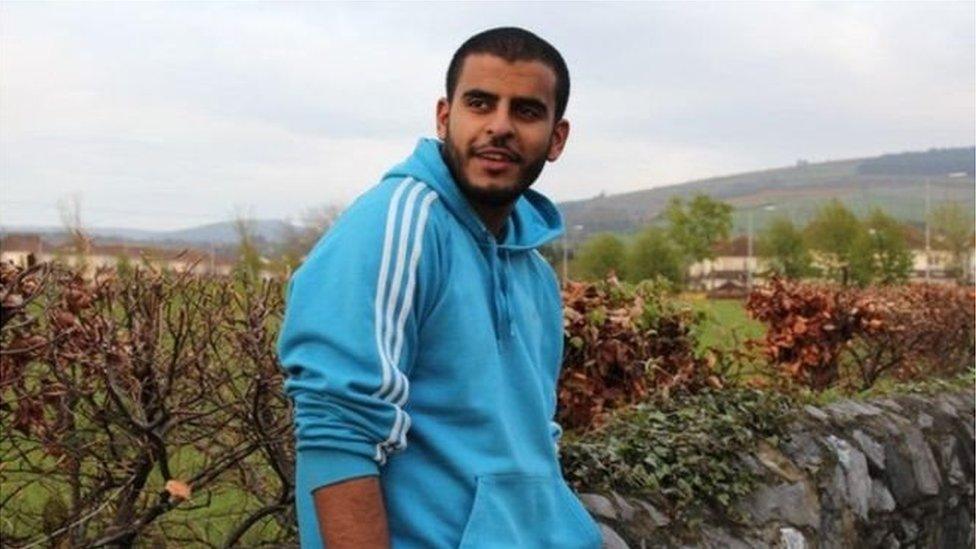
Ibrahim Halawa was born and raised in Dublin
Ibrahim Halawa, a 21-year-old Irishman, spent more than four years of his life in prison in Egypt, after he was arrested on a family summer holiday.
He was released on 20 October after being acquitted of all the charges against him.
He was detained by the Egyptian security forces after he and three of his sisters were caught up in a siege at a mosque in Cairo in August 2013.
The women were freed and allowed to return home within three months, but their teenage brother was kept in jail.
He faced a mass trial with hundreds of others under threat of the death penalty.
Ireland's largest mosque
Ibrahim Halawa was born and raised in Dublin and is a son of the most senior Muslim cleric in the Republic of Ireland.
His father, Sheikh Hussein Halawa, is the imam of Ireland's largest mosque in the Dublin suburb of Clonskeagh.
Hussein Halawa and his wife are both originally from Egypt but they moved their young family to Dublin a year before Ibrahim was born.
For many years, their children regularly made trips to the couple's homeland.
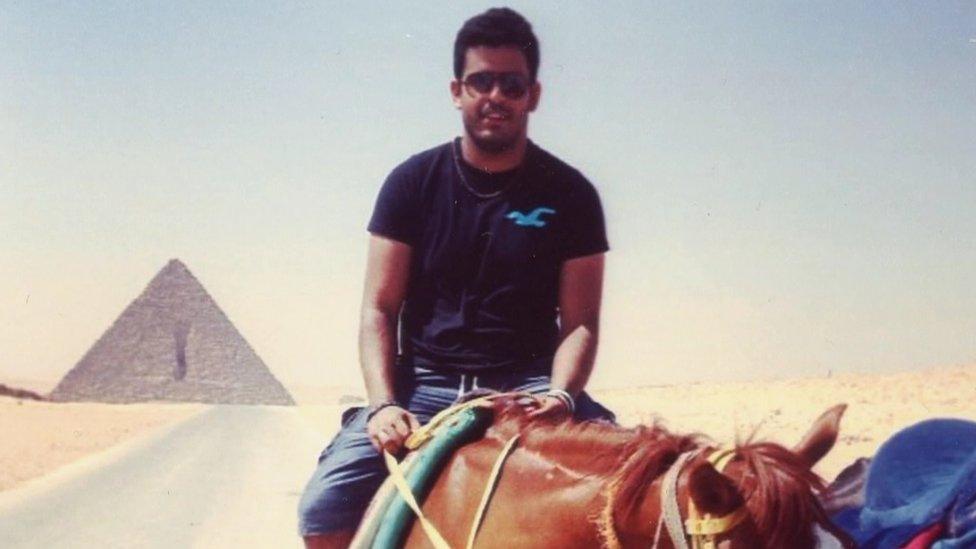
Ibrahim Halawa has been held in an Egyptian prison for four years
In the summer of 2013, the then 17-year-old Ibrahim Halawa accompanied three of his elder sisters on a family holiday to Egypt.
Their trip coincided with violent anti-government protests in Cairo, staged in support of the ousted President Mohammed Morsi.
The family was sheltering in the Al-Fath mosque in the city on 17 August 2013 when the building was stormed by the Egyptian security forces.
The tense stand-off followed a day of bloody clashes in which more than 170 people died.
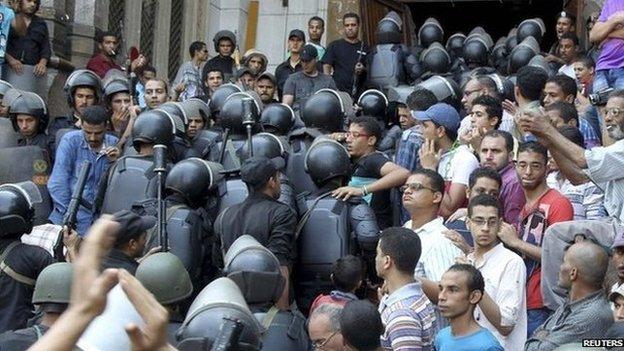
Security forces moved into al-Fath mosque and made hundreds of arrests
The mosque siege lasted most of the day, with exchanges of gunfire between government forces and the protesters.
Hundreds of people were arrested, including Ibrahim Halawa and his sisters, Omaima, 21; Fatima, 23; and Somaia, 27.
The three women were imprisoned for three months without being charged with an offence, but were released and returned to Dublin in November 2013.
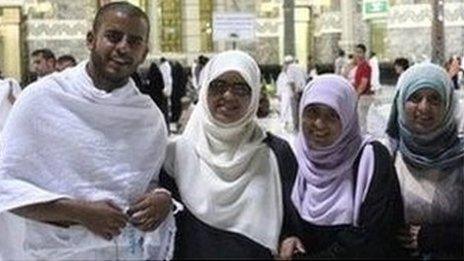
Ibrahim Halawa was arrested along with his sisters Fatima, Omaima and Somaia
However, their youngest brother was not allowed to join them, and remained in prison, detained without trial.
Beaten in jail?
When they got back home to Ireland, the Halawa sisters joined a growing international campaign to secure his release, publicly asking the Irish government to do more to help his cause.
His 18th birthday was spent in prison without prospect of release.
The teenager was then accused, along with nearly 500 others, of inciting violence, riot and sabotage and faced a mass trial.
However, with so many defendants involved in the case, it took years to come to court.
The family has always denied claims that Ibrahim is a member of the Muslim Brotherhood, which is Egypt's oldest and largest Islamist organisation.
They also claimed he was beaten and abused in jail and complained he was being held in dirty, overcrowded conditions.
The Irish government raised the case repeatedly with the Egyptian authorities.
Greste's cellmate
In 2015, it was revealed that Ibrahim Halawa had once shared a cell with Australian journalist Peter Greste.
The former BBC correspondent spent more than 400 days in prison in Egypt after he was arrested along with two colleagues while working for al-Jazeera.
At the time of Mr Greste's release, Somaia Halawa told the BBC that the journalist had helped keep her brother's spirit up in the cells.
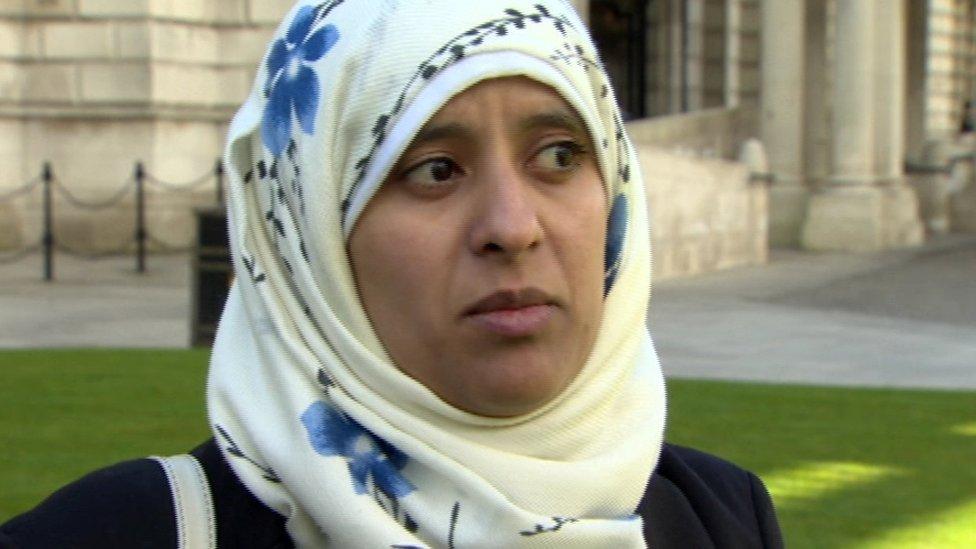
Somaia Halawa called on the Irish government to do more to secure her brother's release
In September 2016, the family released a letter Ibrahim wrote to them to mark the date he should have graduated from college in Dublin.
He had intended to study for a degree in engineering.
The letter described how he was sharing a dormitory cell with 30 others, sleeping in a space just over one foot wide.
He wrote: "Today, while every graduate throws their graduation hat in the sky to come down with the long waiting dream, I don't see the sky.
"Because I'm enrolled in a different college. A college I did not know I had applied for when I chose to fight for freedom.
"A college that kidnapped me from life to teach me the principles of real life. A college full of lessons. A lot of which I have learned in dark mornings and nights."
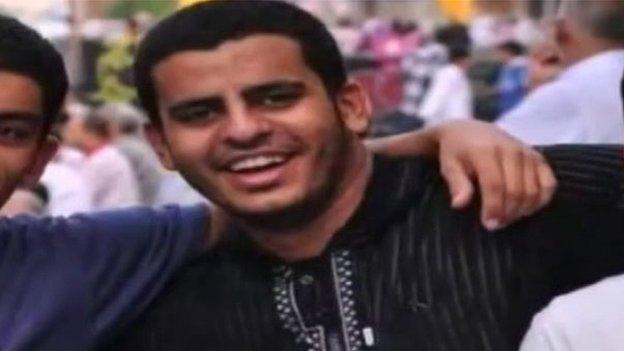
As a schoolboy, Ibrahim Halawa had hoped to study engineering
He added that his incarceration had taught him to find humanity in everyone, and had given him a deep sense of compassion for others.
"In this college I'm obliged to live with a broad diversity of inmates. From presidential consultants and college professors, to illiterate criminals, which taught me to seek the real human being behind every social rank."
Hunger strikes
In January this year, the Egyptian president told a delegation of Irish politicians that he would offer a pardon to Mr Halawa, once his trial was over.
However, the mass trial was adjourned more than 30 times and his family warned they did not believe he would survive the lengthy legal process.
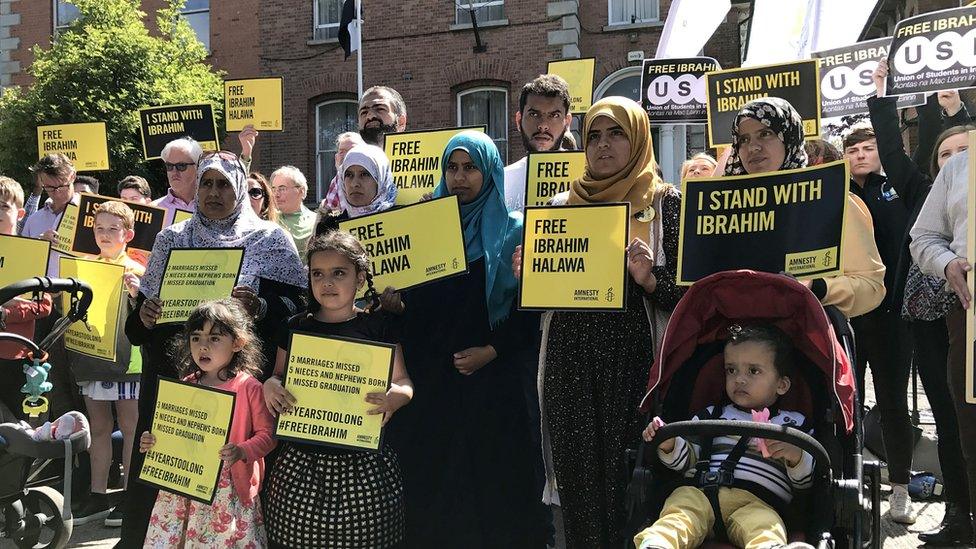
In August 2017, family and friends protested outside protest outside the Egyptian embassy in Dublin on the fourth anniversary of his incarceration
During his four-year imprisonment, Ibrahim Halawa staged a series of intermittent hunger strikes in protest against his continued detention without trial.
At one point in March this year, he became so weak that jail staff used a wheelchair to bring him to a family prison visit.
After the 20th adjournment, Somaia Halawa warned: "The sad reality is my brother is dying in an Egyptian prison, facing a mass trial, which at this rate will take over 10 years.
"Given Ibrahim's current mental and physical state we don't believe he will be strong enough to survive that delay."
The following month, the Irish government arranged for a doctor to visit her brother in jail.
An Egyptian judge said he would consider a request to release him on medical grounds.
The trial finally got under way in August.
On 18 September, Ibrahim Halawa was acquitted on all charges he faced.
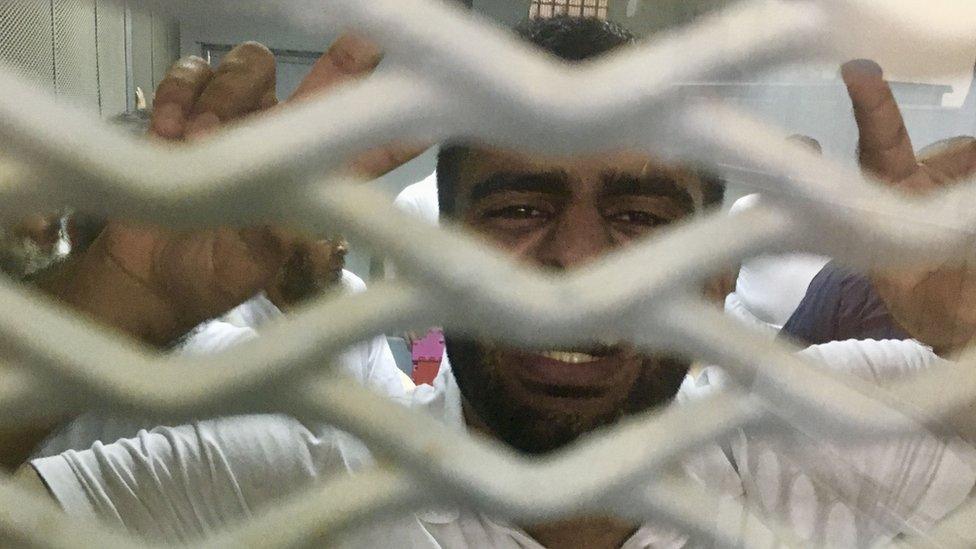
An emotional Ibrahim Halawa celebrates his acquittal
His sister Nosayba Halawa told RTÉ News: "We don't know when he'll be released and when he'll be home but I hope it will be soon. He has suffered a lot."
On 19 October, Mr Halawa's family confirmed that he had been released from jail.
Campaigners from the Free Ibrahim Halawa Facebook group posted: "We will now begin to make arrangements to bring him home where he belongs in Ireland."